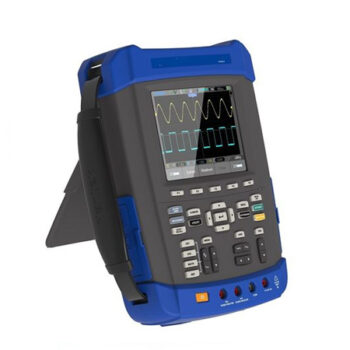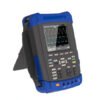| Model | DOS-72F | DOS-102F | DOS-152F | DOS-202F |
| Acquisition |
| Sample Modes | Real-Time Sample |
| Acquisition Modes | |
| Normal | Normal data only |
| Peak Detect | High-frequency and randon glith capture |
| Average | Wavefom Average, selectable 4,8,16,32,64,128 |
| Inputs |
| Inputs Coupling | AC, DC, GND |
| Inputs Impendance | 1MΩ±2% ‖20pF±3pF |
| Probe Attenuation | 1X, 10X |
| Supported Probe Attenuation Factor | 1X, 10X, 100X, 1000X |
| Maximum Input Voltage | CAT I and CAT II: 300VRMS (10×), Installation Category;
CAT III: 150VRMS (1×) |
| Horizontal System |
| Sample Rate Range | 1GS/s |
| Waveform Interpolation | (sin x)/x |
| Record Length | 2M |
| SEC/DIV Range | 4ns/div~2000s/div, in a 2, 4, 8 sequence | 2ns/div~2000s/div, in a 2, 4, 8 sequence |
Sample Rate and
Delay Time Accuracy | ±50ppm over any ≥1ms time interval |
| Scanning Speed Range | 4ns/div to 8ns/div; (-8div x s/div) to 40ms;
20ns/div to 80μs/div;(-8div×s/div) to 40ms
200μs/div to 40s/div; (-8div×s/div) to 400s | 2ns/div to10ns/div;
(-4div×s/div) to 20ms; |
Delta Time Measurement Accuracy
(Full Bandwidth) | Single-shot, Normal mode:± (1 sample interval +100ppm × reading + 0.6ns);
>16 averages:± (1 sample interval + 100ppm × reading + 0.4ns);
Sample interval = s/div ÷ 200 |
| Vertical System |
| Vertical Resolution | 8-bit resolution, all channel sampled simultaneously |
| Volts Range | 2mV/div to 100V/div at input BNC |
| Bandwidth | 70MHz | 100MHz | 150MHz | 200MHz |
| Rise Time at BNC( typical) | 5ns | 3.5ns | 2.3ns | 1.8ns |
Analog Bandwidth in
Normal and Average
modes at BNC or with probe,
DC Coupled | ±400V(100V/div-20V/div);
±50V(10V/div-5V/div)
±40V(2V/div-500mV/div);
±2V(200mV/div-50mV/div)
±400mV(20mV/div-2mV/div) |
| Math | +, -, *, /, FFT |
| FFT | Windows:Hanning, Flatop, Rectamgular, Bartlett, Blackman; 1024 sample point |
| Bandwidth Limit | 20MHz |
| Low Frequency Response (-3db) | ≤10Hz at BNC |
| DC Gain Accuracy | ±3% for Normal or Average acquisition mode, 100V/div to 10mV/div.
±4% for Normal or Average acquisition mode, 5mV/div to 2mV/div. |
DC Measurement Accuracy,
Average Acquisition Mode | Measurement Type: Average of ≥16 waveforms with vertical position at zero
Accuracy: ± (3% × reading + 0.1div + 1mV) when 10mV/div or greater is selected.
Measurement Type: Average of ≥16 waveforms with vertical position not at zero
Accuracy: ± [3% × (reading + vertical position) + 1% of vertical position + 0.2div]. |
Volts Measurement Repeatability,
Average Acquisition Mode | Delta volts between any two averages of ≥16 waveforms acquired under same setup and ambient conditions |
| Trigger System |
| Trigger Types | Edge, Video, Pulse, Slope, Over time, Alternative |
| Trigger Source | CH1, CH2, AC Line |
| Trigger Modes | Auto, Normal, Single |
| Coupling Type | DC, AC, HF Reject, LF Reject, Noise Reject |
Trigger Sensitivity
(Edge Trigger Type) | DC(CH1,CH2):
1div from DC to 10MHz; 1.5div from 10MHz to 100MHz; 2div from 100MHz to Full;
AC: Attenuates signals below 10Hz ;
HF Reject: Attenuates signals above 80kHz;
LF Reject: Same as the DC-coupled limits for frequencies above 150kHz; attenuates signals below 150kHz. |
| Trigger Level Range | CH1/CH2: ±8 divisions from center of screen; |
| Trigger Level Accuracy( typical)Accuracy is for signals having rise and fall times ≥20ns | CH1/CH2: 0.2div × volts/div within ±4 divisions from center of screen; |
| Set Level to 50%(typical) | Operates with input signals ≥50Hz |
| Video Trigger | |
| Video Trigger Type | CH1, CH2: Peak-to-peak amplitude of 2 divisions; |
| Signal Formats and Field Rates | Supports NTSC, PAL and SECAM broadcast systems for any field or any line |
| Holdoff Range | 100ns ~ 10s |
| Pulse Width Trigger | |
| Pulse Width Trigger Mode | Trigger when (< , >, = , or ≠); Positive pulse or Negative pulse |
| Pulse Width Trigger Point | Equal: The oscilloscope triggers when the trailing edge of the pulse crosses the trigger level.
Not Equal: If the pulse is narrower than the specified width, the trigger point is the trailing edge. Otherwise, the oscilloscope triggers when a pulse continues longer than the time specified as the Pulse Width.
Less than: The trigger point is the trailing edge.
Greater than (also called overtime trigger): The oscilloscope triggers when a pulse continues longer than the time specified as the Pulse Width |
| Pulse Width Range | 20ns ~ 10s |
| Slope Trigger | |
| Slope Trigger Mode | Trigger when (< , > , = , or ≠ ); Positive slope or Negative slope |
| Slope Trigger Point | Equal: The oscilloscope triggers when the waveform slope is equal to the set slope.
Not Equal: The oscilloscope triggers when the waveform slope is not equal to the set slope.
Less than: The oscilloscope triggers when the waveform slope is less than the set slope.
Greater than: The oscilloscope triggers when the waveform slope is greater than the set slope. |
| Time Range | 20ns ~ 10s |
| Overtime Trigger | |
| Over Time Modee | Rising edge or Falling edge |
| Time Range | 20ns ~ 10s |
| Alternative Trigger | |
| Trigger on CH1 | Internal Trigger: Edge, Pulse Width, Video, Slope |
| Trigger on CH2 | Internal Trigger: Edge, Pulse Width, Video, Slope |
| Trigger Frequency Counter | |
| Readout Resolution | 6 digits |
| Accuracy (typical) | ±30ppm (including all frequency reference errors and ±1 count errors) |
| Frequency Range | AC coupled, from 4Hz minimum to rated bandwidth |
| Signal Source | Pulse Width or Edge Trigger modes: all available trigger sources
The Frequency Counter measures trigger source at all times, including when the oscilloscope acquisition pauses due to changes in the run status, or acquisition of a single shot event has completed.
Pulse Width Trigger mode: The oscilloscope counts pulses of significant magnitude inside the 1s measurement window that qualify as triggerable events, such as narrow pulses in a PWM pulse train if set to < mode and the width is set to a relatively small time.
Edge Trigger mode: The oscilloscope counts all edges of sufficient magnitude and correct polarity.
Video Trigger mode: The Frequency Counter does not work. |
| Measure |
| Cursor Measurement | Manual: Voltage difference between cursors: △V
Time difference between cursors: △T
Reciprocal of △T in Hertz (1/ΔT);
Tracing: The valtage and time at a waveform point; |
| Auto Measuerment | Frequency, Period, Mean, Pk-Pk, Cycli RMS, Minimum, Maximum, Rise time, Fall Time, +Pulse Width, -Pulse Width, Delay1-2Rise, Delay1-2Fall, +Duty, -Duty, Vbase, Vtop, Vmid, Vamp, Overshoot, Preshoot, Preiod Mean, Preiod RMS, |
| Scope Trendplot | 1.2M Point |
| General Specifications |
| Display Resolution | 640 horizontal by 480 vertical pixels |
| Display Contrast | Adjustable (16 gears) with the progress bar |
| Probe Compensator Output | |
| Output Voltage( typical) | About 2Vpp into ≥1MΩ load |
| Frequency(typical) | 1kHz |
| Power Supply | |
| Supply Voltage | AC Input:100-240VACRMS,0.6A MAX,50Hz~60Hz; DC Output:9V,2A |
| Power Consumption | <30W |
| Environmental | |
| Temperature | Operating: 32℉ to 122℉ (0℃ to 50℃);
Nonoperating: -40℉ to 159.8℉ (-40℃ to +71℃) |
| Cooling Method | Convection |
| Humidity | +104℉ or below (+40℃ or below): ≤90% relative humidity;
106℉ to 122℉ (+41℃ to 50℃): ≤60% relative humidity |
| Altitude | Operating: Below 3,000m (10,000 feet);
Nonoperaring: Below 15,000m(50,000 feet) |
| Mechanical | |
| Size | 260mmmm; 220mm; 75mm |
| Weight | 2.5KG(without Packing) |





